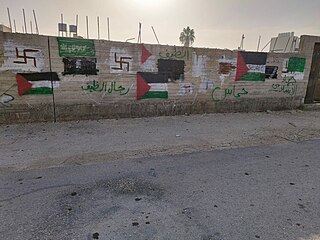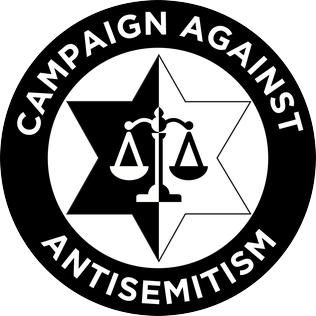The Board of Deputies of British Jews, commonly referred to as the Board of Deputies, is the largest and second oldest Jewish communal organisation in the United Kingdom, after the Initiation Society which was founded in 1745. Established in 1760 by a group of Sephardic Jews, the board presents itself as a forum for the views of most organisations within the British Jewish community, liaising with the British government on that basis. Notably, while Lord Rothschild was President of the Board of Deputies, the Balfour Declaration was addressed to him and eventually led to the creation of a Jewish state in Palestine. It is affiliated to the World Jewish Congress and the European Jewish Congress. The current president is Marie van der Zyl.
The Australia/Israel & Jewish Affairs Council (AIJAC), represents the interests of the Australian Jewish community to government, politicians, media and other community groups and organisations through research, commentary and analysis. The organisation is directed by Colin Rubenstein, who was previously a political science lecturer at Monash University. AIJAC has office locations in Melbourne and Sydney. AIJAC is formally associated with the American Jewish Committee.

Jewish Voice for Peace is an American anti-Zionist left-wing Jewish advocacy organization that is critical of Israel's occupation of the Palestinian territories, and supports the Boycott, Divestment and Sanctions (BDS) campaign against Israel.

Israel–New Zealand relations are the foreign relations between the State of Israel and New Zealand. While Israel has an embassy in Wellington, New Zealand's embassy in Ankara, Turkey is accredited to Israel. Diplomatic relations between the two countries date back to January 1949. New Zealand has exported a mixture of agricultural and manufactured goods to Israel. In return, Israel has exported a range of manufactured goods to New Zealand. Bilateral relations between the two countries have been complicated by issues such as the 2004 Israel–New Zealand passport scandal, United Nations Security Council Resolution 2334, and the Israel-Palestine conflict.
Antisemitism at universities has been reported and supported since the medieval period and, more recently, resisted and studied. Antisemitism has been manifested in various policies and practices, such as restricting the admission of Jewish students by a Jewish quota, or ostracism, intimidation, or violence against Jewish students, as well as in the hiring, retention and treatment of Jewish faculty and staff. In some instances, universities have been accused of condoning the development of antisemitic cultures on campus.
Antisemitic incidents escalated worldwide in frequency and intensity during the Gaza War, and were widely considered to be a wave of reprisal attacks in response to the conflict.
Antony Lerman is a British writer who specialises in the study of antisemitism, the Israeli–Palestinian conflict, multiculturalism, and the place of religion in society. From 2006 to early 2009, he was Director of the Institute for Jewish Policy Research, a think tank on issues affecting Jewish communities in Europe. From December 1999 to 2006, he was Chief Executive of the Hanadiv Charitable Foundation, renamed the Rothschild Foundation Europe in 2007. He is a founding member of the Jewish Forum for Justice and Human Rights, and a former editor of Patterns of Prejudice, a quarterly academic journal focusing on the sociology of race and ethnicity.

The Anti-Defamation League (ADL), formerly known as the Anti-Defamation League of B'nai B'rith, is a New York–based international Jewish non-governmental organization and advocacy group.

Racism in the Palestinian territories encompasses all forms and manifestations of racism experienced in the Palestinian Territories, of the West Bank, Gaza, and East Jerusalem, irrespective of the religion, colour, creed, or ethnic origin of the perpetrator and victim, or their citizenship, residency, or visitor status. It may refer to Jewish settler attitudes regarding Palestinians as well as Palestinian attitudes to Jews and the settlement enterprise undertaken in their name.
Antisemitism in France has become heightened since the late 20th century and into the 21st century. In the early 21st century, most Jews in France, like most Muslims in France, are of North African origin. France has the largest population of Jews in the diaspora after the United States—an estimated 500,000–600,000 persons. Paris has the highest population, followed by Marseilles, which has 70,000 Jews. Expressions of antisemitism were seen to rise during the Six-Day War of 1967 and the French anti-Zionist campaign of the 1970s and 1980s. Following the electoral successes achieved by the extreme right-wing National Front and an increasing denial of the Holocaust among some persons in the 1990s, surveys showed an increase in stereotypical antisemitic beliefs among the general French population.
"Khaybar, Khaybar, ya yahud! Jaish Muhammad soufa yaʿoud!" is an Arabic-language rallying slogan referencing the Battle of Khaybar of 628 CE, which began after Muhammad marched with a large Muslim army and besieged Khaybar, an oasis in present-day Saudi Arabia that was home to a notable Jewish community.

Students for Justice in Palestine is a pro-Palestinian college student activism organization in the United States, Canada and New Zealand. It has campaigned for boycott and divestment against corporations that deal with Israel and organized events about Israel's human rights violations. In 2011, The New York Times reported that "S.J.P., founded in 2001 at the University of California, Berkeley, has become the leading pro-Palestinian voice on campus."
Antisemitism in Australia is the manifestation of hostility, prejudice or discrimination against the Australian Jewish people or Judaism as a religious, ethnic or racial group. This form of racism has affected Jews since Australia's Jewish community was established in the 18th century. There are a number of organisations that track antisemitic activities, including the Executive Council of Australian Jewry, that publish an annual list of all reported antisemitic activities. Antisemitism in Australia is perpetrated by a variety of group, and it has manifested in the publication of antisemitic publications, in efforts to prevent Jewish immigration, and in attacks on Australian Jews and their communal institutions.

Campaign Against Antisemitism (CAA) is a British non-governmental organisation established in August 2014 by members of the Anglo-Jewish community. It publishes research, organises rallies and petitions, and conducts litigation.
Belgium is a European country with a Jewish population of approximately 35,000 out of a total population of about 11.4 million. It is among the countries experiencing an increase in both antisemitic attitudes and in physical attacks on Jews.
Antisemitism is a growing problem in 21st-century Germany.
The working definition of antisemitism, also called the International Holocaust Remembrance Alliance definition of antisemitism or IHRA definition, is a non-legally binding statement on what antisemitism is, that reads: "Antisemitism is a certain perception of Jews, which may be expressed as hatred toward Jews. Rhetorical and physical manifestations of antisemitism are directed toward Jewish or non-Jewish individuals and/or their property, toward Jewish community institutions and religious facilities." Accompanying the working definition, but of disputed status, are 11 illustrative examples whose purpose is described as guiding the IHRA in its work, seven of which relate to criticism of the Israeli government. As such, pro-Israeli organizations have been advocates for the worldwide legal adoption of the definition.
Since the foundation of the Conservative Party in 1834, there have been numerous instances of antisemitism in the party, from both Conservative party leaders and other party figures.
Following the Hamas-led attack on Israel on 7 October 2023 and the outbreak of the Israel–Hamas war, there has been a surge of antisemitism around the world. Israeli Immigration Minister Ofir Sofer has stated that Israel is bracing to expect a large wave of Jews migrating to Israel due to the rising antisemitism around the world.
Antisemitism in New Zealand is the manifestation of hostility, prejudice or discrimination against the New Zealand Jewish people or Judaism as a religious, ethnic or racial group. This form of racism has affected Jews since New Zealand's Jewish community was established in the 19th century.






